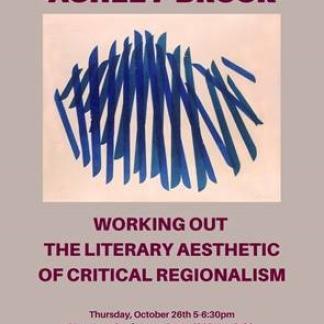Ashley Brock "Working Out the Literary Aesthetic of Critical Regionalism"
Meyerson Conference Room (223 Van Pelt)

In recent years Critical Regionalism has gained traction in cultural studies and postcolonial studies as a theory for reconceiving of relations between metropolitan centers and their geographic margins and redrawing the area studies map. This talk traces the term back to its origins, in architectural theory and Adornian negative dialectics, to ask how Critical Regionalism might be articulated as a literary aesthetic. What might such an aesthetic look like? Has it been theorized under other names? Focusing on the reconfiguration that regionalist literature in the Americas underwent over the course of the twentieth century, I ask how a radically reconceived and formally experimental poetics of place might respond to the cultural and geo-political shifts that gave rise to the discourse of Critical Regionalism in the first place. How might critical regionalist literature, if we grant such a category, offer a new mode of engagement with the pressing stakes of contemporary debates surrounding uneven development, cultural imperialism, migration, displacement, and cultural and linguistic belonging beyond the bounds of the nation-state?